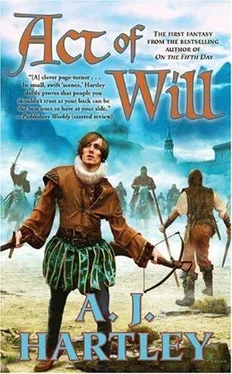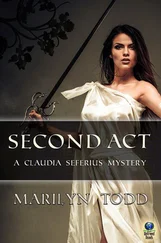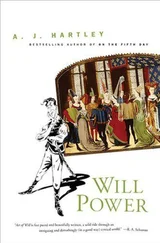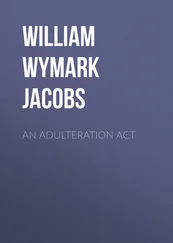Andrew Hartley - Act of Will
Здесь есть возможность читать онлайн «Andrew Hartley - Act of Will» весь текст электронной книги совершенно бесплатно (целиком полную версию без сокращений). В некоторых случаях можно слушать аудио, скачать через торрент в формате fb2 и присутствует краткое содержание. Год выпуска: 2009, ISBN: 2009, Жанр: Фэнтези, на английском языке. Описание произведения, (предисловие) а так же отзывы посетителей доступны на портале библиотеки ЛибКат.
- Название:Act of Will
- Автор:
- Жанр:
- Год:2009
- ISBN:978-0-7653-2124-4
- Рейтинг книги:5 / 5. Голосов: 1
-
Избранное:Добавить в избранное
- Отзывы:
-
Ваша оценка:
- 100
- 1
- 2
- 3
- 4
- 5
Act of Will: краткое содержание, описание и аннотация
Предлагаем к чтению аннотацию, описание, краткое содержание или предисловие (зависит от того, что написал сам автор книги «Act of Will»). Если вы не нашли необходимую информацию о книге — напишите в комментариях, мы постараемся отыскать её.
Act of Will — читать онлайн бесплатно полную книгу (весь текст) целиком
Ниже представлен текст книги, разбитый по страницам. Система сохранения места последней прочитанной страницы, позволяет с удобством читать онлайн бесплатно книгу «Act of Will», без необходимости каждый раз заново искать на чём Вы остановились. Поставьте закладку, и сможете в любой момент перейти на страницу, на которой закончили чтение.
Интервал:
Закладка:
We left the tavern at a moderate pace and I kept my eyes turned down. With a flick of the reins Orgos set our four Cherrati mares walking out of the inn’s yard and into the streets. I fiddled with my crossbow and wondered if I should just shoot myself now and save them the trouble.
SCENE VI The gatehouse
A light summer rain had begun to fall as we left the inn. The Cresdon streets were rapidly being churned to mud by cart wheels, horse hooves, and the shaggy, lumbering cattle they breed in these parts. Orgos steered the wagon expertly enough and, at first, said nothing, so I was free to take a last look at the city, as we hit potholes of reeking, stagnant water deep enough to drown a sheep. All in all I wasn’t going to miss this place too much, even if I knew absolutely sod-all about what lay outside it.
Frequently we slowed to a virtual stop to negotiate the wagon through streets so narrow that we scraped against houses and shops on both sides. Most of them were white plaster and timber-framed ruins that tier fractionally outwards like inverted pyramids. The thatched roofs on either side of the street almost meet in the middle, but at ground level you can drive a wagon through. Just. I lost count of the number of times the street was blocked by some imbecile taking his geese or chickens to market. It took us three-quarters of an hour to cover about a mile and a half, a good ten minutes of which was spent arguing with the red-faced driver of the hay cart that was coming from the opposite direction.
I was not used to handling weapons (other than wholly ineffectual stage swords, of course, and since I had played almost nothing but girls, I didn’t get to handle those much either), and the feel of the crossbow in my hands, though it was little more than a toy, excited me. As we passed the hay carter, I let him glimpse it and he stopped throwing insults at us. Orgos noticed and frowned at me.
“Sorry,” I said. “I wouldn’t have used it.”
“You got that right,” he remarked warningly. “And use your accent.”
“What? Why? There’s no one around.”
“Get used to it now,” he insisted, still using the nasal, singsong tones himself, “and you’ll be more comfortable should it become essential.”
“I’m shy,” I answered with a coy smile that was supposed to amuse him and make him sympathetic. It didn’t.
He leaned his face close to me and his black eyes fastened on to mine as he whispered, “This is not a game, boy, and there is more than just your scrawny neck on the chopping block. I am not requesting that you practice that accent, I am telling you to. Else get off my wagon.”
“Right,” I muttered, scared of his earnestness.
“What?” he demanded, making his point carefully.
“I mean, right you are, there, sir,” I replied in the best imitation of Cherrat as I could manage. He grinned, satisfied, and his white teeth glowed impossibly in his black face. His features seemed capable of slipping from death-threatening hostility into amiable good humor without so much as a pause for thought.
I hadn’t spent much time amongst black people for, in these parts, they tended to be wealthy merchants: hardly the types to frequent the Eagle. When you saw them it was usually in the marketplace, and I mean the traders’ market, not the bruised-fruit-and-rancid-meat places. They were well dressed, well spoken, and accompanied by servants and occasionally “attendants” (the euphemistic term applied to bodyguards to keep them legal). These guards couldn’t carry much in the way of arms in the town, of course, but they could be weighed down with plate armor and battle-axes on the roads. That was legal so long as they didn’t travel in groups of more than four.
People tended to be respectful of the black merchants for their wealth and education, but you sometimes got a sense of resentment simply because they were outsiders, a resentment aggravated by the fact that our town was occupied by foreigners. I was rather fascinated by the darkness of Orgos’s skin, the tight curl of his hair, and the broad features of his face. Fascinated, but not reassured. I don’t suppose I’d ever been this close to a black man before, and that actually made me feel worse. I wouldn’t miss this lousy town, if I got out of it, but Orgos, with his fake accent and unfamiliar appearance, reminded me of how little I knew of the outside world I was being thrown into, and I resented him for it. Whether I resented him enough to turn him over to the guards on the gate remained to be seen.
“What was that flash of light?” I said, suddenly remembering something that had been nagging at me.
“What flash of light?”
“Back at the inn,” I said. “When the soldiers came in. There was a flash of light, bright like a firework. I wasn’t looking right at it, but I saw the way it lit the room and then. I don’t know. I got confused or sick or something.”
“It must have been a spark from swords clashing,” he said. He stared ahead of him.
“A spark that lit the whole room?” I said. “No way.”
“I can’t think of what else it would be,” he said. “I didn’t notice it.”
I knew he was lying, but I had no idea why or what else it could have been, and since he was twice my size, a notorious criminal, and armed to the teeth, I said nothing.
We got stuck behind a cart containing a peasant family in bright but soiled clothes, though they were less relevant than the two underfed bullocks pulling them. We had to (I could barely believe it possible) reduce speed.
All cursing aside, we came to the gatehouse too soon for my liking. Once again, I felt the steely grasp of terror’s mailed gauntlet tightening about my genitals. Around us the houses, hawkers, and wandering livestock had melted away and we found ourselves in a corner of the great sand-colored stone wall that circled the city. Fifty feet up, pairs of infantrymen walked the parapeted wall. Sentries, their white diamond-motif cloaks drawn about them against the rain, looked down upon us through the eyeholes of bright steel helms, their bows over their shoulders. I stared wide-eyed at Orgos, who made the smallest calming gesture with one hand and reined the horses.
At the angle of the two vast walls was the gatehouse, surmounted by a watchtower. The bullock cart in front of us stopped and the driver climbed down. A burly foot patrolman was asking him questions and pointing dismissively at the people in the wagon.
The dozen guards who stood alert in the gateway itself were the business end of the Empire. They too wore the white diamonded cloaks, but they bore large round shields protecting them from knee to shoulder. Iron cuirasses encased their thoraxes, and their helms were crested with white horsehair and left only their eyes uncovered. Over their thighs and abdomens they wore skirts of white linen with metal rings sewn on. Shortswords hung at their waists, a pair of light javelins stood by their sides, and in their right hands they clasped long wooden spears tipped with fine steel. They scared the living daylights out of me.
If I was to give myself up and turn Orgos over to the Empire, these were the men I would be assisting. Of course I had seen them before, but never had I seen them as an enemy might. They looked almost invulnerable, which, I’m sure, was the idea. They also looked like an army, like conquerors. Orgos and the rest of them scared me, but in a different way. They still seemed human, I suppose. I looked at the steel-clad guards by the gate, their weapons ready and their eyes concealed by the shade of their faceless helms, and I saw them as the myriad blades of some vast mincing machine. They stood immaculate and motionless before us: soullessly disciplined. One glance at their iron at such close quarters illumined tracts of land, towns, and peoples ground beneath a regulated, even march. Suddenly they didn’t look like the kind of people I wanted to help. In a purely subjective moment, the decision was made.
Читать дальшеИнтервал:
Закладка:
Похожие книги на «Act of Will»
Представляем Вашему вниманию похожие книги на «Act of Will» списком для выбора. Мы отобрали схожую по названию и смыслу литературу в надежде предоставить читателям больше вариантов отыскать новые, интересные, ещё непрочитанные произведения.
Обсуждение, отзывы о книге «Act of Will» и просто собственные мнения читателей. Оставьте ваши комментарии, напишите, что Вы думаете о произведении, его смысле или главных героях. Укажите что конкретно понравилось, а что нет, и почему Вы так считаете.












